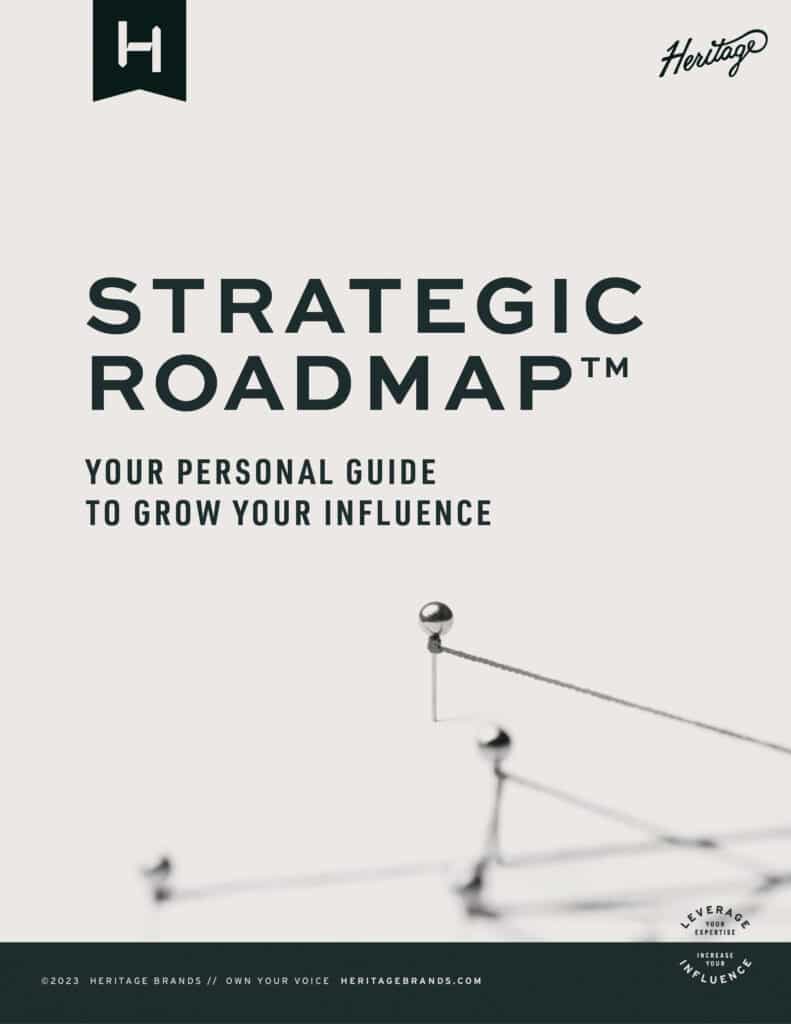I get more and more questions lately from leaders and experts in my network who are all asking me some version of the same question: “Franklin, I want to be a recognized leader in my space — I think it will be good for business, and it’s something I just want for myself anyway, at the end of the day — but I’m not sure how to get there. Can you help me?”
After meeting with a handful of people to talk through their careers and goals, and to help them understand how becoming a cognizable thought leader in their space can help them get to where they want to go, I asked our team to sit down and aggregate some of our thinking into one single “Start Here”-style article, where we could lay out some initial guidelines for leaders and experts as they think through what becoming (and staying) a thought leader might look like for them.
Enjoy — and if you have questions or feedback, as always, please feel free to reach out to me or to a member of our team here at Heritage.
— Franklin McGuire Jr.
How to Think About Thought Leadership: Resources for Leaders and Experts
I. Beginning with the Big Picture: Reputation Matters
“Your reputation precedes you” – we’ve all heard this saying before, and we know that it’s true, especially for leaders, experts, and any other individual, company, or organization that leans heavily on their name and their reputation for their success. Public figures in government aiming to impact public opinion…Founders and CEOs preparing for a new round of investment or a possible exit…Service providers in lucrative or highly regulated fields competing for new business opportunities…Nonprofits relying on grants and donors to advance their goals…In these scenarios and others like them, reputation can make the difference between success and failure.
“A good name is better than great riches,” King Solomon said millennia ago. “A good man is hard to find,” wrote Flannery O’Connor in 1953, when titling her famous short story. And we all get it – your name matters. Your reputation matters. And it’s not just for individuals – reputation matters for brands, businesses, and organizations just as much as it matters for high-achieving individuals, leaders, and experts.
A good reputation can lead to growth, recognition from peers, and commercial and cultural success – but a bad reputation can end growth before it really even begins.
And a reputation with little to no public reach is like the proverbial tree in the forest that fell but had no one to hear it – it’s irrelevant, almost like it doesn’t even exist.
II. An Introduction to Thought Leadership
For centuries, cultures worldwide (and perhaps especially our achievement-oriented culture here in America) have valued the written word, and have understood the sharing of ideas through books and other writings to be a significant conveyor of authority to the man or woman doing the writing.
Therefore, we value authorship as a form of leadership, and the public sharing of ideas and beliefs as a marker of authority. The word “author” itself even comes from the word “authority” – that’s how deeply we culturally understand an author to be a leader, a public authority about the thing he or she is writing about.
Authors, then, are leaders. They are leaders whose authority is based on their writing and their publishing – i.e. on their thinking. This makes them thought leaders – and this also means that they have an opportunity to have an outsized impact on the world around them through their thought leadership.
Books are still relevant – writing and publishing a book of 45,000 words or more is still, in many ways, the ultimate signaler of authority in professional and public life in America. But they’re just one ingredient – a book is just one part of the puzzle, thanks to the internet and to the explosion in information that we’ve all experienced over just the last twenty years.
Leaders today can publish and amplify their thinking in a dizzying number of ways: Writing and interacting early and often on LinkedIn…creating and producing a high-quality podcast that is highly relevant and valuable to a listener base who is important to the podcaster…emailing their private following on a consistent and useful basis…using short-form video on social media to attract and connect with new followers and audiences…leveraging a book launch to land speaking engagements at conferences and events across the country…seeking and sourcing online reviews to give people looking for them some “social proof” about them or their brand (and why you, your brand, or your product or service offering are the best choice for them)…and so the list goes on.
Ultimately, the methods are many but, at the end of the day, the end goal is always the same – to build a public reputation as a leader through your thinking and your publishing, whether you’re publishing your first book, your next LinkedIn post, or your hundredth podcast episode.
What you say, if said well, can make you an authority – and that can drive the reputation you desire for yourself or your brand, which then will unlock the doors of opportunity for you as you cut through the noise and rise above your peers and competitors to become a recognizable leader within your sphere of influence.
III. So – What’s a Leader to Do?
While it is neither an easy nor a quick task for them, leaders who desire to rise above and stand out must investigate their operating environment, determine the right ways and places through which to establish their authority and signal their expertise, and then they must actually do the work – consistently, and over a long period of time – to get to the destination they have charted out for themselves. For example:
- The public figure in government comes up with innovative ways to connect with his constituents – perhaps he publishes his quick takes consistently on Twitter, writes longer-form opinion pieces for LinkedIn, and then launches a podcast through which he connects on a personal and human level with constituents at scale.
- The CEO looking for investment or new business revenue decides that being seen and known as the expert in her field will be the fastest and surest way to establishing market credibility – so she writes a book that appears in airports across the country, and then leverages bits and pieces of content from the book to get active and consistent in her posting on social media, on the channel where her industry is most active.
- The nonprofit leader decides to motivate his internal audience through team spotlights on social media and in staff-wide emails, while also launching a podcast to use as a trigger for inviting top-tier development targets into his world and the world of his nonprofit. He then uses video clips from the podcast to grow his following on social media, and segments of copy from the show’s transcripts to keep his professional social media account active and engaging.
Again, as these examples and many others like them illustrate, the methods and tools are many, but the end goal is always the same – to build a public reputation as a thought leader through the consistent publication of relevant and high quality content.
Today, most of the publishing activity in our society and most of the conversations happening in our world are all happening online, in a new-age media landscape that is uncommonly democratic. Since the launch of Facebook in 2004 (less than 20 years ago!), the invention and release of the iPhone (2007), and the passing of a billion subscribers on Apple’s Podcast platform (2013), power has continued to shift more and more from the traditional gatekeepers of access to the masses (tv stations, radio, newspapers, etc.) to the individual people in the masses themselves. Today, anyone can start a podcast or a YouTube channel or a Substack blog and, if his content is relevant, timely, and useful, he could see himself with a following larger than that of the “legacy players” within just a few years or even months.
Thanks to the internet, then, the game today has totally changed for leaders and experts who want to establish themselves as thought leaders in their fields. The principles of reputation and authority are the same as they’ve always been (and always will be), but the tools and tactics have changed substantially, as has the strategy employed to reach that ultimate destination of “thought leader.”
IV. Tying It All Together
This brief introduction barely scratches the surface of all the things leaders and experts should be thinking about today once they make the decision to stand out and be successful as thought leaders within their fields. The resources below can help guide your continued journey forward as you learn more about how to become a thought leader and how to manage and grow your reputation online, but in the end, remember the guiding principles discussed above, and you will be on your way to a better understanding of thought leadership and why it is relevant to experts, leaders, businesses, nonprofits, and others in America today.
Resources
- “Building a Powerful Personal Brand, featuring Rory Vaden,” The Ed Mylett Show. Podcast. Published July 26, 2022.
Listen in to Ed Mylett and Rory Vaden, MBA CSP CPAE as these two fascinating thought leaders discuss the research and consumer behavior driving the latest thinking around online reputation management and brand building. Listening to this interview is the first place we always recommend people start if they want to learn more about what they and their brand need to do to stand out, earn trust, and build authority within their market.
- “Should You Write That Book?” 2Bobs: Conversations on the Art of Creative Entrepreneurship. Podcast. Published September 22, 2021.
https://2bobs.com/podcast/should-you-write-that-book
Don’t take our word for it – this conversation between David C. Baker and Blair Enns, two foremost authorities on positioning and business development for owners of expert firms, definitively answers the question of whether writing a book can impact the author’s business and brand in positive ways.
- “What is a ‘heritage brand’ anyway, and why becoming one doesn’t take 496 years anymore — an introduction to a new series on Trust and Reputation,” Franklin McGuire Jr. LinkedIn Article. Published September 9, 2022.
https://www.linkedin.com/pulse/what-heritage-brand-anyway-why-becoming-one-doesnt-take-mcguire-jr-/
Our Founder and CEO here at Heritage Brands, Franklin McGuire Jr., explains how brand equity is built (and destroyed) in our modern digital age. Drawing on research from Deloitte and on first-party data collected at Heritage over years of work in content marketing and publishing, this article helps equip leaders with a better understanding of the connection between trust and brand equity.
- “Enterprise Trust: Put Trust Behind Everything You Do,” Deloitte. Whitepaper, Report, and Symposium. Published 2021.
https://www2.deloitte.com/content/dam/Deloitte/us/Documents/risk/future-of-trust-pov-21.pdf
In this heavily-researched report, two principals from Deloitte discuss the emerging research Deloitte is doing in the Trust space, and explain why trustworthy companies outperform non-trustworthy companies by 250%. Trust is intimately connected to reputation and, therefore, to thought leadership as well, so we highly recommend this report to leaders who need to understand how the trustworthiness of their brand impacts their mission and outcomes, financial and otherwise.
- “5 Steps to Becoming a Private Equity Thought Leader,” Niall Durkan. Blog Post. November 13, 2018.
https://durkangroup.com/articles/5-steps-to-becoming-a-private-equity-thought-leader/
While written for a private equity-focused audience, the principles Durkan discusses in this piece are relevant for any leader in a complex, lucrative, or highly regulated field who is looking to stand out and establish authority and relevance as a thought leader.

